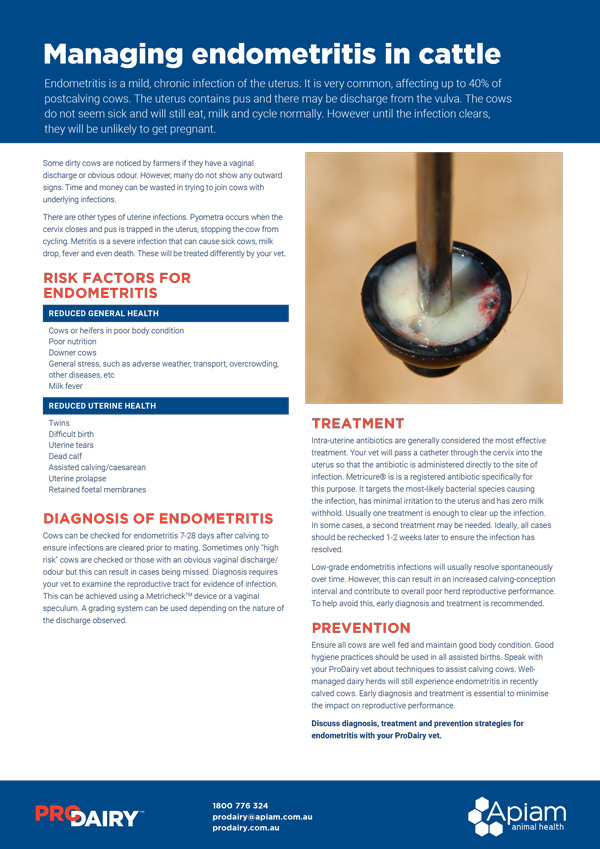Endometritis is a mild, chronic infection of the uterus. It is very common, affecting up to 40% of postcalving cows. The uterus contains pus and there may be discharge from the vulva. The cows do not seem sick and will still eat, milk and cycle normally. However until the infection clears, they will be unlikely to get pregnant.
Some dirty cows are noticed by farmers if they have a vaginal discharge or obvious odour. However, many do not show any outward signs. Time and money can be wasted in trying to join cows with underlying infections.
There are other types of uterine infections. Pyometra occurs when the cervix closes and pus is trapped in the uterus, stopping the cow from cycling. Metritis is a severe infection that can cause sick cows, milk drop, fever and even death. These will be treated differently by your vet.
RISK FACTORS FOR ENDOMETRITIS
REDUCED GENERAL HEALTH
- Cows or heifers in poor body condition
- Poor nutrition
- Downer cows
- General stress, such as adverse weather, transport, overcrowding, other diseases, etc
- Milk fever

REDUCED UTERINE HEALTH
- Twins
- Difficult birth
- Uterine tears Dead calf
- Assisted calving/caesarean
- Uterine prolapse
- Retained foetal membranes
DIAGNOSIS OF ENDOMETRITIS
Cows can be checked for endometritis 7-28 days after calving to ensure infections are cleared prior to mating. Sometimes only “high risk” cows are checked or those with an obvious vaginal discharge/ odour but this can result in cases being missed. Diagnosis requires your vet to examine the reproductive tract for evidence of infection. This can be achieved using a MetricheckTM device or a vaginal speculum. A grading system can be used depending on the nature of the discharge observed.
TREATMENT
Intra-uterine antibiotics are generally considered the most effective treatment. Your vet will pass a catheter through the cervix into the uterus so that the antibiotic is administered directly to the site of infection. Metricure® is is a registered antibiotic specifically for this purpose. It targets the most-likely bacterial species causing the infection, has minimal irritation to the uterus and has zero milk withhold. Usually one treatment is enough to clear up the infection. In some cases, a second treatment may be needed. Ideally, all cases should be rechecked 1-2 weeks later to ensure the infection has resolved.
Low-grade endometritis infections will usually resolve spontaneously over time. However, this can result in an increased calving-conception interval and contribute to overall poor herd reproductive performance. To help avoid this, early diagnosis and treatment is recommended.
PREVENTION
Ensure all cows are well fed and maintain good body condition. Good hygiene practices should be used in all assisted births. Speak with your ProDairy vet about techniques to assist calving cows. Well managed dairy herds will still experience endometritis in recently calved cows. Early diagnosis and treatment is essential to minimise the impact on reproductive performance.
